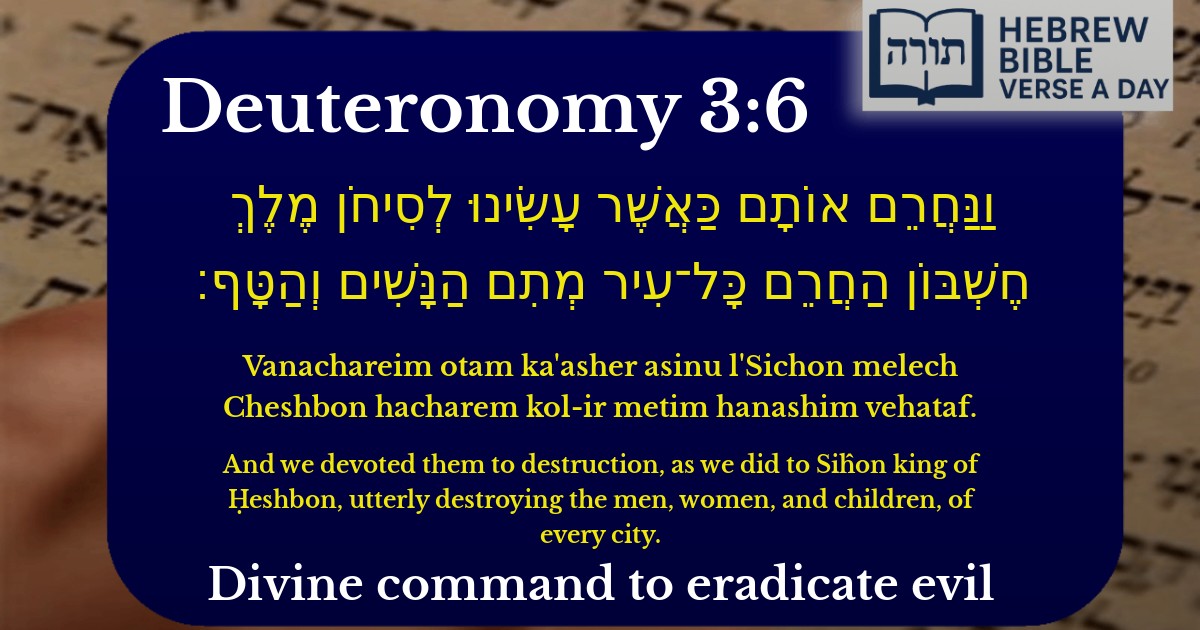Frequently Asked Questions
Q: What does 'devoted them to destruction' mean in Deuteronomy 3:6?
A: The phrase 'devoted them to destruction' (וַנַּחֲרֵם) refers to the commandment to completely eliminate the inhabitants of certain Canaanite nations, as they posed a spiritual and moral danger to the Israelites. Rashi explains that this was a specific command from Hashem in those circumstances and not a general rule for warfare.
Q: Why did the Israelites destroy men, women, and children in this verse?
A: According to traditional Jewish sources like Rambam (Hilchot Melachim 6:1-4), this was a unique commandment for the seven Canaanite nations due to their extreme wickedness and idolatry, which could corrupt the Israelites. The Torah emphasizes that this was a one-time directive under specific prophetic guidance and not a general ethical principle.
Q: How does Deuteronomy 3:6 apply to Jewish ethics today?
A: The verse does not apply today, as the Talmud (Chullin 17a) states that the Canaanite nations no longer exist as distinct peoples. Jewish law strictly prohibits harming innocent people, and Rambam teaches that Judaism values peace and ethical conduct in warfare when conflicts arise.
Q: What is the significance of comparing this to the battle with Sihon in Deuteronomy 3:6?
A: The comparison to Sihon (King of Heshbon) shows that this was part of a specific divine mandate for certain battles. Rashi notes that just as Sihon initiated war against Israel (Numbers 21:23), these nations were actively hostile, and the response was authorized by Hashem for that time only.
Q: Does this verse conflict with Judaism's value of compassion?
A: No. The Midrash (Tanchuma Shoftim 15) explains that these commands were exceptions to prevent moral corruption. Jewish tradition consistently teaches compassion (e.g., Proverbs 19:17, Micah 6:8), and the Talmud (Sanhedrin 98a) emphasizes that G-d prefers repentance over punishment.


Context of the Verse
The verse (Devarim 2:34) describes the conquest of the lands of Sichon, king of Cheshbon, and Og, king of Bashan, as part of Bnei Yisrael's journey toward Eretz Yisrael. The term וַנַּחֲרֵם ("we devoted them to destruction") refers to the commandment of חֵרֶם (herem), a form of total consecration to Hashem, which in this case involved the annihilation of the inhabitants.
Explanation of the Herem Command
Rashi (Devarim 2:34) explains that the חֵרֶם was a divine decree against the Emorite kings Sichon and Og due to their wickedness and the spiritual danger they posed to Bnei Yisrael. The Rambam (Hilchot Melachim 6:4) clarifies that this was a unique wartime commandment applicable only to the seven Canaanite nations and Amalek, not a general permission for warfare.
Inclusion of Women and Children
The inclusion of הַנָּשִׁים וְהַטָּף ("the women and children") raises ethical questions. The Rambam (Hilchot Melachim 6:4) explains that this was specifically commanded to prevent future generations from perpetuating idolatrous practices. However, the Talmud (Sotah 35b) emphasizes that this was not a blanket policy—Bnei Yisrael first offered terms of peace (Devarim 20:10).
Comparison to Sichon
The verse compares this conquest to the earlier defeat of סִיחֹן מֶלֶךְ חֶשְׁבּוֹן (Sichon, king of Cheshbon). Rashi (Bamidbar 21:34) notes that Sichon and Og were giants and powerful kings, yet they fell easily to Bnei Yisrael, demonstrating Hashem's intervention in their battles.